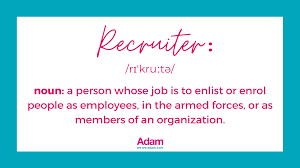
There are 5 common types of recruiters, and it is likely that if you are on an extended job search, you will come across all of them.
Internal, In House, or Corporate*: Internal recruiters work for and source full-time employees for the company they work for and are paid a salary and benefits like any other employee. Companies often use contractors to work as recruiters to avoid paying outside agency fees, effectively insourcing this activity. Example: WalMart, US Army, Amazon, Google
Contingency Recruiter: A Contingency Recruiting Agency does a full-time employee search on a contingency (paid only if they find a candidate) basis for a client company. The recruiter is responsible to do the initial recruiting, screening and interviewing and arranging interviews with the candidates for the client/company. The company pays either a flat fee or a percentage of the first year’s salary usually 15-35% depending on the difficulty. Jobseekers do not have to pay a fee. A lot of regular staffing companies typically offer contingency services too. They will typically advertise these jobs as ‘Direct Hire’ or ‘Contract to hire’ to indicate they are different than the regular staffing positions. Example: Robert Half, Spherion, Matrix-FA
Retained Recruiter: A Retained Agency is similar to a contingency recruiting with the main difference that the client company pays a retainer (fixed upfront amount) fee to have that company perform a search. A portion of the search fee is paid upfront and the remainder is due upon a successful hire. The initial retainer fee is paid irrespective of whether a placement is made. This is more typical for higher level positions to incentivize the recruiter to spend time on a low probability of placement. (It is harder to find a CEO, CFO as opposed to a software developer) Such firms may also call themselves Executive Search firms to distinguish the kind of talent they acquire.
Example: Korn Ferry, Witt Kiefer
PS: Both Contingent and Retained Search companies are also commonly called “Headhunters”. (A term many recruiters don’t like).
Staffing Agency (Temp/Contract): A Temporary/Contract Staffing Firm hires temporary employees for a client’s company. The individual is employed by the staffing agency and the staffing agency pays all wages, employer taxes, medical insurance and benefits. For all purposes the individual is an employee of the staffing company but their work is determined by the client where they work. The client company pays an hourly rate for the contract/temp employee which is higher than the employee cost – the premium or markup to take care of the staffing company’s costs and profits in exchange for the flexibility and ease of hiring and terminating such resources.
Example: Volt, Adecco, Manpower, Aerotek
Outplacement Recruiter: An Outplacement Agency provides job seeking assistance to downsized/displaced/riffed employees. Often the employer will hire an outplacement company to help their recently downsized workforce find jobs as a matter of goodwill. Outplacement services provide resume and interviewing assistance, career counseling, etc. Several of these companies are divisions of larger staffing companies.
*https://www.oncontracting.com/article/the-5-different-types-of-recruiters.html
Regardless of which recruiter approaches you, there are some “Do’s” and some “Don’ts” to keep in mind.
DO:
Tell the truth – Recruiters cross reference information, check references, check education claims. That’s their job! If you have been out of work for a while or are concerned about a past issue, be up front. Recruiters have pretty much seen and heard it all and will know immediately whether they are wasting your time – and theirs.
Always be on Time – When a recruiter wants to talk about a potential role or even wants to interview you for an impending one, it’s crucial not to be late. The recruiter always wants to put the best candidate forward for a job. They’ll be taking note of the basics when it comes to timing, appearance and preparedness before they refer you on. Show up approximately 10-15 minutes before if in person. Dress well, be organised and friendly even if you’re Zooming the meeting!.
Don’t:
Ghost a recruiter -While your recruiter may not be able to help you with one specific role at one specific time, they may be able to help you with a role in the future. In this day and age, jobs aren’t forever. It’s in your best interests not to completely ghost a recruiter if things didn’t work out the first time round. Be strategic and think ahead, do not ghost your recruiter.
Bluntly say that you won’t do something minor – If there’s merely one aspect of the job spec that you’re not overly thrilled about, it’s better not to say ‘well I’m not doing that’. You can navigate the small things before signing a contract. Try to be open minded without compromising your preferences.
It’s important to remember that a recruiter wants you to succeed – because then they have also succeeded. Be sure that you are really interested in the job they are recruiting for and show that interest when you talk with them. If you are not interested – say so, that doesn’t mean that a recruiter won’t keep you in mind as they take up other positions to fill. The better relationship you can create, the better the chance that they will help you find your dream job!
